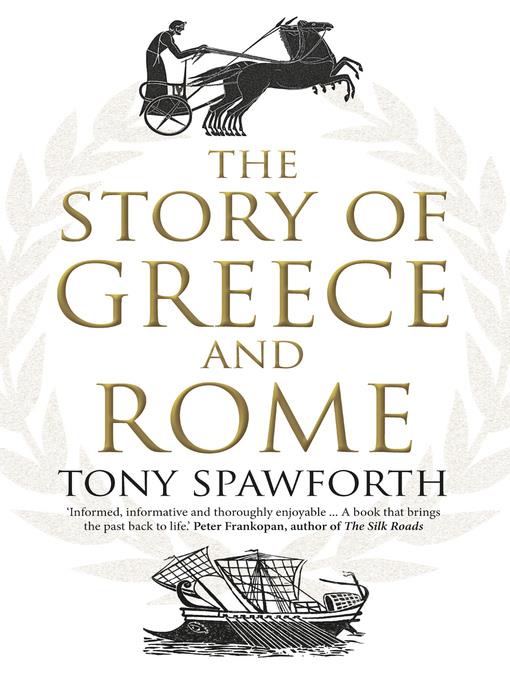
The Story of Greece and Rome
کتاب های مرتبط
- اطلاعات
- نقد و بررسی
- دیدگاه کاربران
نقد و بررسی

Starred review from September 24, 2018
This excellent survey by British historian Spawforth (Greece and the Augustan Cultural Revolution) spans the rise and fall of the Greco-Roman world, from the Aegean city-states that became Greece to the final days of the Roman Empire in the fifth century CE, which set the stage for current Western civilization. Through an interdisciplinary approach that includes history, anthropology, and literature, Spawforth traces the growth of Rome from a small part of the Italian peninsula to the multiethnic “Roman Peace” that extended from Hadrian’s Wall in the British Isles to what is now modern Turkey, with much cultural and religious detail along the way. For example, he makes clear how receptive both Greek and Roman civilizations were to foreign (i.e., “barbarian”) influences from Mesopotamia, Egypt, and Carthage. In addition to straightforward historical narrative, Spawforth makes quite unexpected but relevant connections; in the first pages of a chapter about early Christianity, he refers—among other things—to a colleague’s obscure literary theory, Jonathan Haidt’s 21st-century research on moral psychology, a 1912 Japanese passage explaining emperor worship, and Catholics being blamed for the 1666 Great Fire of London. This conversational yet erudite history is a treat.

In this ambitious, entertaining, and fleet-footed survey, Spawforth (ancient history, Newcastle Univ., UK; The Complete Greek Temples) recounts the developments of what is now called classical civilization. The author's objective is to introduce these societies to novice readers of the period, beginning with Neolithic Greece (7,000 BCE) and concluding some 8,000 years later with the rise of the first Islamic Caliphate. The work traverses this substantial period mostly successfully, visiting key figures, developments, and major archaeological discoveries while only occasionally being too oblique in references. Given this breadth, a few errors invariably creep in (e.g., referring to Pompey as younger than Julius Caesar), and parts of the narrative frenetically scamper across both centuries and regions, in litanies of rulers, wars, and reversals, particularly in the concluding chapter. Lastly, the abundant personal anecdotes about Spawforth's own academic development and archaeological experiences frequently consume too much time but do enhance the author's authority. VERDICT While the pacing might overwhelm at times, this is overall a worthy and enjoyable introduction for readers seeking a general sense of the interwoven world of ancient Greece and Rome.--Evan M. Anderson, Kirkendall P.L., Ankeny, IA
Copyright 1 Library Journal, LLC Used with permission.
September 15, 2018
A welcome survey of the two greatest powers in the ancient Mediterranean world and their bound destinies.The ancient Greeks, as BBC presenter Spawforth (Emeritus, Ancient History/Newcastle Univ.; Versailles: The Biography of a Palace, 2008) observes, "were migrants and emigrants" who established far-flung colonies and told stories of wandering, not the least of them The Odyssey. The Romans, who admired the Greeks more than any of their other neighbors, were committed to the notion that they had always been at the center of the world, yet were it not for their regard for the Greeks, "the cultural legacy of Greece would not have been preserved and cultivated to anything like the extent that it was." The author digs deep into Greek and Roman history to find similarities and differences while also considering relations with other powers--e.g., Carthage, Egypt, Persia. Spawforth also considers the nature of Greek and Roman political power, real and imagined, as with Plato, of whose Republic he writes, "how serious Plato was about the achievability of this totalitarian vision is a debate among experts which we cannot go into here." The author is an uncommonly clear explainer of troublingly complex issues. Why did Julius Caesar break a promising alliance with Pompey? At least in part, he writes, because the more Caesar achieved militarily, the more a jealous Pompey was courted by the "conservative aristocrats" who had long tried to dissolve the partnership. How did Christianity overwhelm the Roman Empire and polytheistic Greece as well? At least in some small measure, via writings that wooed the literate populace in such a way as to "snag the interest of educated Greek-speaking people in the non-Jewish world" by punning, for instance, on the name of Jesus and the verb meaning "to cure."In a time when education in the classics is ever scarcer, this is an attractive and learned introduction to a history that reverberates in present events.
COPYRIGHT(2018) Kirkus Reviews, ALL RIGHTS RESERVED.

























دیدگاه کاربران